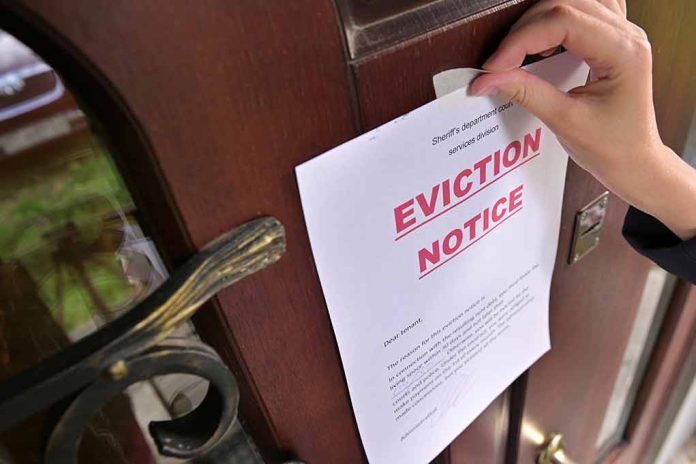
A Kentucky homeowner’s act of kindness backfires, leaving him homeless and his property in the hands of squatters.
At a Glance
- Daniel Toma allowed friends to stay in his garage, who then refused to leave
- Squatters changed locks, set up utilities, and claimed tenant rights
- A protective order forced Toma to stay 500 feet away from his own property
- The case highlights the challenges homeowners face with squatters’ rights
- Toma is now contesting the protective order to reclaim his home
Homeowner’s Generosity Leads to Loss of Property
In a shocking turn of events, Kentucky resident Daniel Toma has found himself ousted from his own home after a judge sided with squatters who were once his friends. The incident began when Toma allowed Amy Davis and Tyler Sencuk to stay in his garage temporarily after their car broke down. This act of kindness spiraled into a legal nightmare that has left Toma homeless and fighting to reclaim his property.
The situation escalated when Davis and Sencuk changed the locks on the garage, installed cable, and began receiving mail at Toma’s address. When Toma attempted to evict them with a 30-day notice, the couple refused to leave, citing squatters’ rights. The legal battle took an unexpected turn when Sencuk obtained an emergency protective order against Toma, accusing him of being a threatening roommate.
A Kentucky homeowner says he has been forced out of his own home after letting some guests stay in his garage while they fixed their car.
— 13 Action News (@13abc) September 13, 2024
Legal System Favors Squatters
The judge’s decision to grant the protective order has forced Toma to stay 500 feet away from his own property, effectively rendering him homeless. This case sheds light on the challenges homeowners face when dealing with squatters and the complexities of eviction laws. Kentucky law requires a formal eviction process to remove squatters, which can be a lengthy and costly procedure.
“I just want this nightmare to end. I’ve been homeless the last few days,” he told the outlet. “I feel like I have no power. I feel like I have no rights.”
Toma’s case is not an isolated incident. Reports of squatters are increasing nationwide, with many homeowners feeling their rights have been limited since the pandemic and increased tenant protections. Legal experts note that squatters can often file criminal reports against homeowners to temporarily remove them from the property, as seen in Toma’s situation.
Protecting Property Rights
This case serves as a stark reminder for homeowners to be cautious when allowing individuals to stay on their property. Legal experts recommend having formal agreements with anyone allowed to stay in a home, even temporarily. Additionally, homeowners should keep their premises secure and have someone maintain the property if they are away for extended periods.
“Unfortunately, what is occurring here is all too common when it comes to squatters in the United States,” Ryan McCall, principal with McCall Sweeney & Silva, PC and an expert in eviction law, told Newsweek.
For those facing similar situations, it’s crucial to understand that taking matters into your own hands can lead to legal complications. Homeowners should not attempt to remove squatters themselves, change property locks, or turn off utilities without proper legal procedures. The eviction process for squatters must be done correctly to avoid further legal issues.
A Call for Legal Reform
Toma’s ordeal highlights the need for a review of squatters’ rights laws and their impact on legitimate property owners. As cases like this continue to emerge, there is growing concern among homeowners about the balance between protecting tenants’ rights and safeguarding property owners from exploitation.
As Toma prepares to challenge the protective order in court, his case serves as a cautionary tale for homeowners across the nation. It underscores the importance of understanding property laws and the potential risks of informal living arrangements. For now, Toma’s struggle continues, as he fights to reclaim not just his property, but his sense of security and faith in the legal system designed to protect homeowners.













